Editor's note: ASU Juris Doctor candidate Ember Van Vranken recently traveled to New York for the U.N. Global Engagement Summit as part of her volunteering with the WE Empower global business competition. This is her first-person account of her experience.
During the 2018 summer break, Professor Diana Bowman offered me the opportunity to volunteer as a student judge for the WE Empower competition. My student-judge volunteer responsibilities included attending a short training session to learn the judging criteria and judging 10 out of the 150 applicants. The applications included short essays and video submissions from the entrepreneurs explaining their business vision and how their business supports the United Nations Sustainable Development Goals (SDGs). Upon completion of our judging responsibilities, the student judges were entered into a random drawing to attend the 2018 United Nations Global Engagement Summit in New York with the five WE Empower awardees; I was chosen, and this is the story of my New York journey.
MORE: Female entrepreneurs strengthen sustainable businesses through WE Empower Challenge
Day 1
Meeting the attendees
To start off the week, I met with the five awardees and watched as each practiced her pitch. Habiba Ali from Nigeria is the founder and managing director of Sosai Renewable Energies Nigeria. Ali was inspired to spread information and access to solar-powered lamps after learning of the detrimental health effects caused by indoor use of kerosene lanterns. Many families in rural Nigeria live without electricity and instead use kerosene lanterns for many household needs. Ali learned that just two hours in an unventilated room with a kerosene lantern is equivalent to smoking two packs of cigarettes per day. This knowledge inspired her to utilize Sosai solar lamps as a solution to the great danger plaguing many of Nigeria’s rural people.
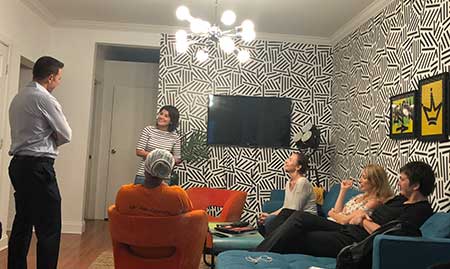
Aaron Risner, Hadeel Mustafa Anabtawi, Marta del Rio Villanueva, Shimrit Perkol-Finkel, Marijana Savic and Habiba Ali practice for the pitch night. Photos throughout courtesy of Ember Van Vranken
Hadeel Mustafa Anabtawi from Jordan is the founder of The Alchemist Lab. Mustafa Anabtawi began the lab to address gaps in the educational system through problem-solving experiences. She seeks to foster skills that can assist the youth of the region to deal with the many challenges the future may present. Through her work in education, she was dismayed to see bright young girls give up on their careers and educational dreams as a result of societal pressures to pursue marriage. Mustafa Anabtawi began the Go Girls Initiative to engage young girls in the area of STEM and to encourage the mindset that anything is possible.
Marijana Savic from Serbia founded the NGO Atina to combat human trafficking and violence against women. Hoping to create a self-sustainable program rather than rely solely on donor support, Savic founded Bagel Bejgl, which helps to financially support Atina and serves as a reintegration program for victims of human trafficking by providing training and employment.
Marta del Rio Villanueva from Peru founded Wasi Organics. Through Wasi Organics, del Rio Villanueva creates healthy snacks from rare Peruvian superfoods via economically and environmentally sustainable methods. Also, Wasi supports local Peruvian farmers by using single-origin ingredients. Tasting the Wasi black corn chips proved that they are just as delicious as they are healthy.
Shimrit Perkol-Finkel from Israel is the co-founder of ECOncrete, which makes a specially formulated concrete additive that not only protects but stimulates the marine ecosystem. The patented product has the potential to turn coastlines that are rapidly becoming barren concrete jungles to thriving aquatic ecosystems. Additionally, the life forms that grow on the ECOncrete increase the product’s strength as the remains of diseased coral build upon the surface of the structure. This added strength helps to protect the integrity of the structure while creating a carbon sink, making ECOncrete a win-win environmental solution.
Public-speaking tips from Hundredth Monkey Collective
Aaron Kisner, the CEO of Hundredth Monkey Collective, coached the awardees on public speaking. Hundredth Monkey specializes in connecting extraordinary ideas to targeted audiences. Kisner began with a routine to calm nerves, which included several stretches and power movements. These movements help improve confidence by changing the flow of endorphins in the body. He next taught breathing techniques to perfect the delivery of the speech.
Kisner briefly discussed the types of questions the judging panel might ask and advised the group to think of the questions they hoped would not be asked and to devise a plan of attack in case such questions arose. The session concluded with each awardee delivering her speech to the room, and Kisner providing individualized feedback.
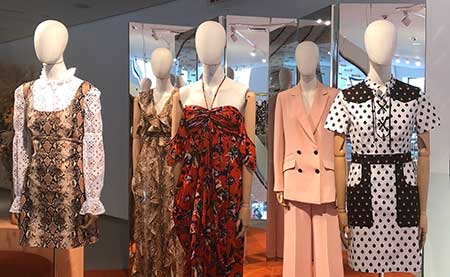
Display at the Diane von Furstenberg studio.
Pitch-night preparation at the Diane von Furstenberg studio
Later in the afternoon, we traveled to the Diane von Furstenberg studio, where the awardees practice their pitches in the actual space.
While we waited, we all explored the space and perused Diane von Furstenberg’s spring collection, which is yet to be released. Following the rehearsal, I took in the city views as I walked the High Line back to my Airbnb for the night.
Day 2
We the Future TED Talk
I arrived early to the TED Talk theater for a reception. We were offered a delicious buffet-style lunch and refreshments. During the reception, I was able to mingle with other TED Talk guests and learn about the fascinating work of the TED researchers. I also met Amanda Ellis from the Julie Ann Wrigley Global Institute of Sustainability.
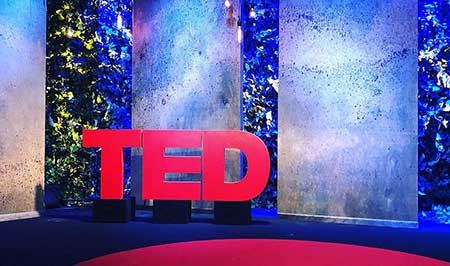
The TED Talk theater.
The We the Future TED talks included live performances by Ayo and Marvin Dolly and several interesting discussions revolving around the SDGs.
Johan Rockstrom delivered a compelling talk discussing the inherent contradictions within the goals. He explained that without specific planning and integration of the goals, efforts to support one goal may inhibit another.
He stressed the need to look beyond the 2030 goals and utilize data collection to attain the SDGs within planetary boundaries. He noted that without finding out-of-the-box solutions, we risk creating a hothouse Earth under the pursuit of the SDGs.
Pitch Night at the Diane von Furstenberg studio
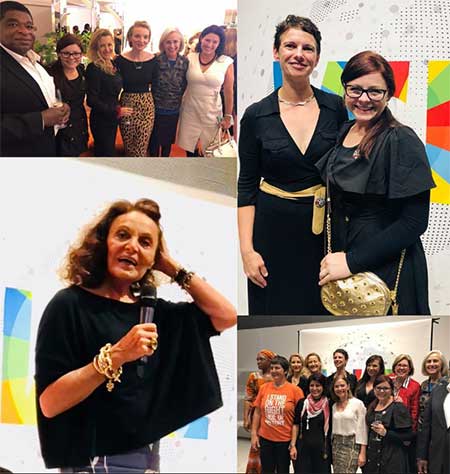
Guests of the WE Empower pitch night at the Diane von Furstenberg studio.
After the pitches, the audience voted in favor of Habiba Ali as the winner. However, Diane von The Diane von Furstenberg Studio transformed from the showroom I saw the previous day to an elegant event space complete with stage, audience seating, champagne service and a judging panel consisting of Diane von Furstenberg, Craig Sproule and Meg Jones.
Furstenberg stated that each of the awardees is a winner and doubled the winning prize from $20,000 to $40,000 and offered $10,000 to each of the other four awardees.
The women were overjoyed with her generosity and invigorated by the crowd's overwhelming support. This evening also provided the awardees invaluable opportunities to network and connect with potential partners and project funders.
Day 3
Fast Company and pitching to the media
We met first thing in the morning with Stephanie Mehta, editor-in-chief of Fast Company. The awardees learned firsthand from journalists how to captivate the media's interest to help inspire a story about their business to further their cause.
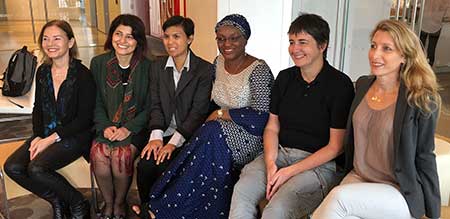
Marta del Rio Villanueva, Hadeel Mustafa Anabtawi, Stephanie Mehta, Habiba Ali, Marijana Savic and Shimrit Perkol-Finkel at Fast Company.
The journalists explained that one must know their audience when pitching to the media — do your homework and understand the types of stories a publisher or journalist seeks before delivering a pitch; if you know what they seek, then you can shape the angle that is of most interest to that publisher or individual. The journalists also explained that even if a journalist does not write the type of articles that work for your cause, they may connect you with another that does, if you appeal to their interests.
UN Solutions Summit
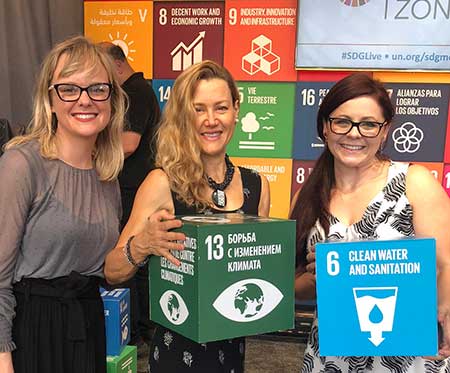
Marianne Dutkiewicz, Amanda Ellis and Ember Van Vranken at the UN Solutions Summit.
At the United Nations Solutions Summit, we heard from entrepreneurs currently supporting the SDGs with innovative solutions. The first presentation explained that Egypt's D-Kimia is a multistep kit that could make blood testing much more manageable for health workers around the world. Next, we learned of the BeeLine Reader, a technology solution for those with dyslexia that has been utilized to read 250 million pages online. The tool converts text to incorporate color that allows the reader's eyes to interpret the text with ease.
Then we learned about Powerstove, which is a prototype, multipurpose clean cook stove that generates power as a family cooks in the traditional African way. Finally, we learned of GI Resilience, a global network of experts and activists committed to fighting organized crime through better information sharing, policy making and resource mobilization. Each entrepreneur was paired with a team of “accelerators,” which are businesses that are uniquely situated to accelerate the expansion and reach of the entrepreneur’s idea.
Blockchain boot camp with Crowd Machine
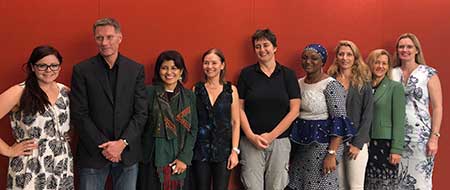
Ember Van Vranken, Craig Sproule, Hadeel Mustafa Anabtawi, Marta del Rio Villanueva, Marijana Savic, Habiba Ali, Shimrit Perkol-Finkel, Amanda Ellis and Meg Jones.
Craig Sproule, the CEO of Crowd Machine, gave a short presentation explaining blockchain and cryptocurrency. He answered the awardees’ questions and concluded the meeting by highlighting how each of the awardees could implement blockchain and cryptocurrency in their business model.
International Leadership Association
Cynthia Cherry from International Leadership Association (ILA) stressed the importance of building a strong network. She explained that connections are the key to success in any industry. Cherry asked each awardee to discuss the first instance in their life when they exhibited leadership and concluded by offering each awardee a leadership coach from ILA and the opportunity to present to ILA members to further expand their network.
Day 4
GroYourBiz and Impact Communications Ltd.
During the meeting with Barbara Mowat, founder of GroYourBiz, we learned about the importance of an advisory board, a group of like-minded entrepreneurs and business people who meet together on a monthly basis to discuss individual struggles and collectively find solutions. At the conclusion of the meeting, Mowat offered to provide to the awardees an advisory board for one year, which she offered to chair. The newly formed board is designed to renew goals monthly and discuss one major difficulty of the awardees’ choosing per month.
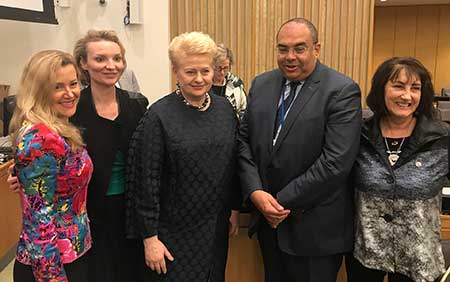
Amanda Ellis, executive director, Hawaii and Asia Pacific, Julie Ann Wrigley Global Institute of Sustainability; Alyse Nelson, CEO of Vital Voices; President Dalia Grybauskaite of Lithuania; Mahmoud Mohieldin, senior vice president of the World Bank; and Barbara Mowat, CEO of GroYourBiz.
Thunderbird for Good
Kellie Kreiser, the executive director of Arizona State University’s Thunderbird for Good at the Thunderbird School of Global Management at ASU, provided each awardee with access to Dream Builder to further the SDGs in their home countries. Kreiser explained that Dream Builder is a free online educational program that supports women entrepreneurs by providing guidance for successful business development. She urged the awardees to use this tool for themselves and to share the tool with other entrepreneurs.
Kreiser also gifted each awardee a SolarSPELL, a solar-powered library. The device can have any content loaded onto it via microchip. The content is accessed by connecting a mobile device to the SolarSPELL. Each one can support up to 25 devices at a time. Kreiser offered to partner with each awardee to ensure the SolarSPELLs contain content that may help the awardee or her community. Mustafa Anabtawi plans to equip SolarSPELL with content from the Alchemist Lab to train teachers and provide educational materials for refugees in Jordan and the surrounding regions.
UN Global Compact
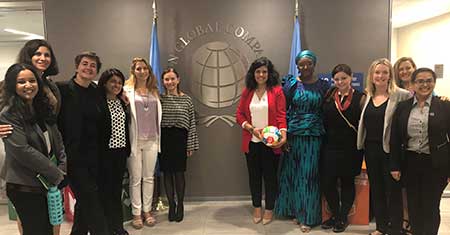
The crew at the UN Global Compact.
During a lunch meeting with the U.N. Global Compact, we discussed methods to bridge the gender gap in business. Specifically, we discussed access to banking services for women around the world as a critical tool in providing access to business for women.
Economic growth through women’s empowerment
The awardees and I had the best seats in the house in the front row for a discussion among the Council of Women World Leaders. Lithuanian President Dalia Grybauskaitė led the discussion on economic growth through women’s empowerment. Also in attendance were, among others, U.N. Secretary-General António Guterres, Croatian President Kolinda Grabar-Kitarović, Estonian President Kersti Kaljulaid, Maltese President Marie-Louise Coleiro Preca, Prime Minister Sheikh Hasina of Bangladesh, Prime Minister Erna Solberg of Norway, President of the World Bank Jim Yong Kim and U.N. High Commissioner for Human Rights Michelle Bachelet.
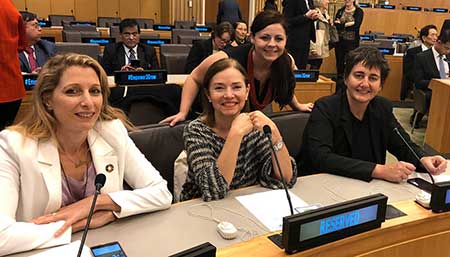
Shimrit Perkol-Finkel, Marta del Rio Villanueva, Ember Van Vranken and Marijana Savic at UN headquarters.
Grybauskaitė remarked that globally women earn 23 percent less than men doing the same job and spend twice as much time on unpaid work. She opined that the current situation violates women’s rights and creates a huge negative impact on the world economy, and she stated that fixing the gender gap will lead to $28 trillion in global growth over the next seven years. Updating education and countering stereotypes will help to expedite gender equality. Grybauskaitė urged the United Nations to help fight discrimination and other world leaders to eliminate laws that discriminate against women in business.
Hasina emphasized the need to undertake three actions to advance gender equality: address gender-specific challenges such as violence against women, create equal opportunities for women in all areas of life and improve the livelihood of women through gender-responsive policy intervention.
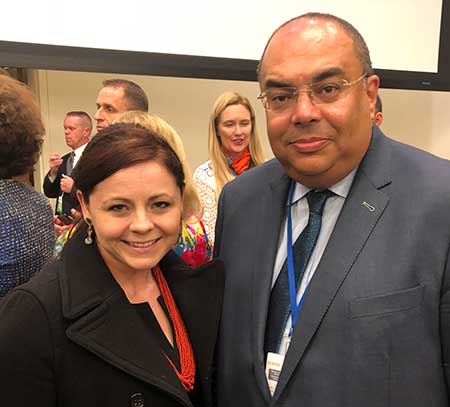
Ember Van Vranken and Mahmoud Mohieldin, the senior vice president of the World Bank.
Guterres remarked that despite the continued increase in women graduates, only 24 percent of senior management positions are filled by women and that the number of women leading Fortune 500 companies fell to under 5 percent this year. He stated that these limitations are not because women cannot lead, but instead as a result of resistance from practical and cultural obstacles at all levels. Guterres called for an end to the female brain drain. He stated that companies with female board members are more profitable and that an increase in female political representation is correlated with increased social spending and decreased inequality. Guterres concluded with an anecdote that the most common argument he encounters against women in leadership is: “Oh, we don’t mind women on the board of the party, but they must be competent,” to which he answers: “Sorry, dear friends, but there only will be equality with incompetent women as members of the board of our party because the board of our party is full of incompetent men.”
The forum concluded by recognizing the five WE Empower awardees and presenting each with a certificate and the SolarSPELL. After the discussion, my mentor Amanda Ellis and I met several of the speakers including Grybauskaitė, Hasina and Mahmoud Mohieldin, the senior vice president of the World Bank.
Day 5
Podcast and interviews with the awardees
This day consisted of preparing and executing both a podcast and interviews aimed at targeting the need for legislative change to bridge the gender gap in business. Each awardee discussed barriers specific to their region for women entering business.
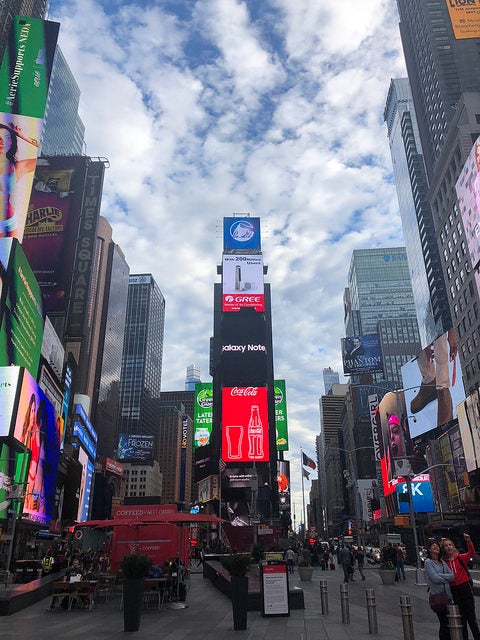
Times Square in New York City.
After the interviews, I had a short interview discussing my experience throughout the week. I had invaluable opportunities to meet and speak with so many amazing people and attend events with influential and knowledgeable speakers. Additionally, getting to know each of the awardees and the team that created the WE Empower competition provided an extraordinary learning experience. Ellis and each awardee are all fantastic women with a plethora of knowledge and experience. Learning about the obstacles the awardees faced and how each persevered through the barriers to create success is both empowering and inspiring as a woman.
Day 6
Women’s Innovation Forum
The forum began with Deanna Bass discussing the five myths of women in business: 1. The fix-women myth; 2. The pipeline myth; 3. STEM is a man’s world myth; 4. The home is the domain of women only myth; and 5. The sexual harassment is a women’s issue myth. Bass explained that women simply think differently; they do not lack confidence or decision-making power. She explained that this system of providing a negative label for female actions while providing no such labels for similar male behaviors is a detriment to women gaining authority in business. Bass further explained that the excuse for the equality gap — that there are no qualified women in the pipeline — is simply not supported by the data considering the number of higher education female graduates.
Madeleine Albright provided each member of the audience a copy of her book, "Fascism: A Warning," and discussed her story, leading to her appointment as the first female U.S. secretary of state. She stressed the importance of women supporting women and spoke of her time serving as the U.N. ambassador and meeting with the six other female ambassadors. They created a counsel named the G7 and vowed always to take each other’s call and lend any support possible to one another. She stated that although the particular countries these women represented were an unlikely alliance, they each faced similar struggles as females in power and benefitted from the support.
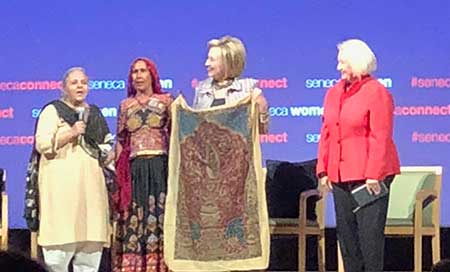
Hillary Clinton at the Women’s Innovation Forum at the Metropolitan Museum of Art.
The forum concluded with Hillary Clinton discussing the opportunity Airbnb provides for women to host guests in their homes as a business.
Global Citizens Concert
The week concluded with VIP passes to the Global Citizens Concert in Central Park. Although the concert had a minor crowd scare, this was a fantastic event to end my first New York City experience.
More Business and entrepreneurship
The business behind the brand
Ask Jennifer Boonlorn ('01 BS in marketing) about the secret to a successful career in the luxury fashion industry and she'll tell you that community building is top of the list."I want to share…

Thunderbird at ASU ranked No. 1 in QS International Trade Rankings for third consecutive year
For the third consecutive year, Thunderbird School of Global Management at Arizona State University has been recognized as the world leader in international trade, a distinction awarded by…

'Meating' dietary needs: Study sheds light on how rising prices affect meat consumption
When prices on certain food items go up — like eggs and meat — because of the rise in plant-based diets, consumers can find an alternative.But our diets are also culturally conditioned, so for some,…
